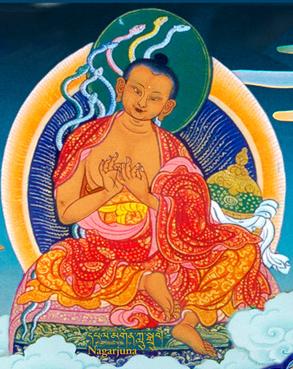Collection of Middle Way Reasoning: Difference between revisions
No edit summary |
|||
| Line 22: | Line 22: | ||
===The Sixth Text=== | ===The Sixth Text=== | ||
Some scholars such as [[Butön Rinchen Drup]] (1290-1364) and [[Longchenpa]] added ''Conventional Existence'' to the other five, and some more recent scholars have added ''The Precious Garland'' (''Ratnavali''), but this is usually included among the collection of advice. | Some scholars such as [[Butön Rinchen Drup]] (1290-1364) and [[Longchenpa]] added ''Conventional Existence'' to the other five, and some more recent scholars have added ''[[The Precious Garland]]'' (''Ratnavali''), but this is usually included among the collection of advice. | ||
===Other Collections=== | ===Other Collections=== | ||
Revision as of 12:36, 29 June 2007

Collection of Middle Way Reasoning (wyl. dbu ma rigs tshogs) One of the main categories of Nagarjuna's writings. Some say that there are five texts in the collection, others say six but there is no consensus on the identity of the sixth text.
The Five Texts
Khenpo Tsöndrü says:
1) the main body-like treatise, the Root Verses of the Middle Way on Wisdom (Mulamadhyamaka-karika) that refutes groups from this (Buddhist) and other traditions.
Then there are the two subsidiary treatises derived from this:
2) The Refutation of Objections, which is an expansion of the first section of the Fundamental Verses on ‘Examining Conditions’; and
3) The Seventy Stanzas on Emptiness, which is an expansion of the seventh section of the Fundamental Verses on ‘Examining Arising, Dwelling and Ceasing’.
Then there are:
4) Sixty Verses on Reasoning, which is a refutation of some within our own (Buddhist) tradition in particular; and
5) Crushing to Fine Powder, which is a refutation of the establishing logic known as the ‘sixteen words and meanings of the logicians.’
Thus there are five texts in the collection altogether.
The Sixth Text
Some scholars such as Butön Rinchen Drup (1290-1364) and Longchenpa added Conventional Existence to the other five, and some more recent scholars have added The Precious Garland (Ratnavali), but this is usually included among the collection of advice.